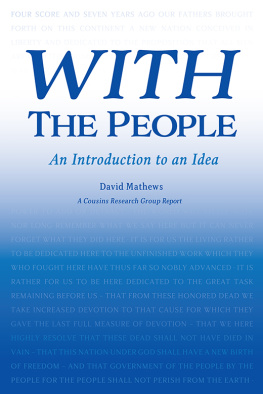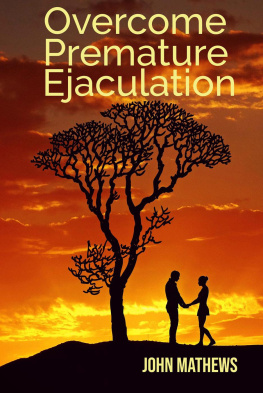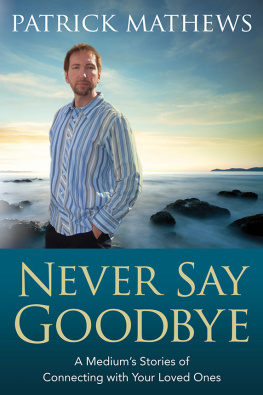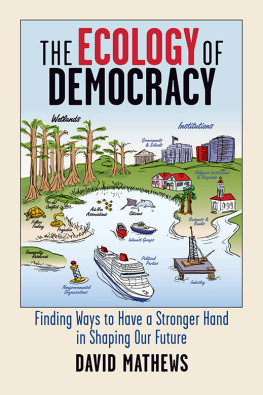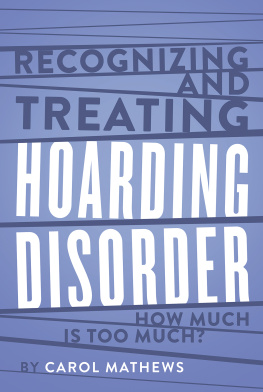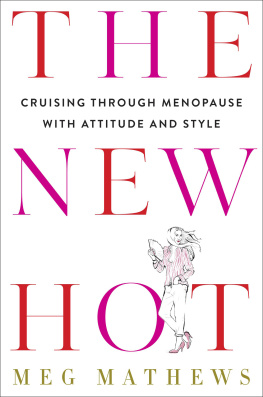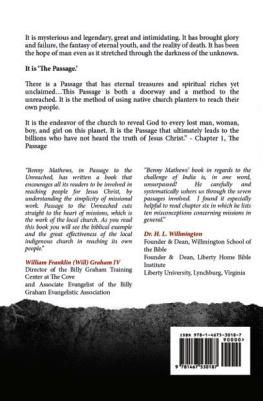ABOUT THE AUTHOR
David Mathews is president and CEO of the Kettering Foundation, a nonprofit research foundation rooted in the American tradition of invention. Prior to his work with the foundation, Mathews served as Secretary of Health, Education, and Welfare in the Ford administration. From 1965 to 1980, he taught history at the University of Alabama, where he also served as president from 1969 to 1980. Mathews earned an AB degree in history and classical Greek. After graduating Phi Beta Kappa from the University of Alabama, he received his PhD in history from Columbia University. Mathews has served on the boards of a variety of organizations, currently including the Gerald R. Ford Foundation, National Issues Forums Institute, Southern Institute on Children and Families, and Public Agenda. He has received numerous awards, and in 2007, the Alabama Center for Civic Life was renamed in his honor. He is also the recipient of 17 honorary degrees. Mathews has written extensively on Southern history, public policy, education, and international problem solving. His books include Politics for People: Finding a Responsible Public Voice, Reclaiming Public Education by Reclaiming Our Democracy, and The Ecology of Democracy: Finding Ways to Have a Stronger Hand in Shaping Our Future. Mathews is married to Mary Chapman Mathews, and they have two daughters and six grandchildren.
Photo and illustration credits:
.
EDITOR: Laura Carlson
COPY EDITOR: Lisa Boone-Berry
RESEARCHER: Sherri Goudy
DESIGN AND PRODUCTION: Laura Halsey Design
COPYRIGHT 2020 David Mathews
ISBN
Print: 978-1-945577-44-4
PDF: 978-1-945577-45-1
E-Pub: 978-1-945577-46-8
WITH THE PEOPLE
An Introduction to an Idea
David Mathews
A Cousins Research Group Report
Kettering Foundation Press
CONTENTS
Dear Reader,
As I write this, the world is dealing with the deadly coronavirus pandemic. It not only endangers our health, it threatens us with feelings of hopelessness, of being unable to control what is happening. We are most vulnerable to this despair when we are alone. The antidote is the strength that comes from joining with others to shape our future, in whatever way we can. This report is about what can be accomplished by working with one another and with the institutions that we created to serve us. We are already seeing some of that happening, beginning in our communities. However, there will be obstacles that stand in the way, and they will loom larger once the crisis fades a bit. There is no vaccine that will prevent future crises or the despair they bring with them. But where there is resilience, it will be found in us, The People.
This is an overview of a longer and more complete book titled, With: Another Way of Thinking about the Relationship between People and Governing Institutions. It explores, in more detail, the possibility of a better relationship between the American people and their governing institutions. The unabridged version, which took years to complete, is in debt to so many researchers and editors that a complete acknowledgment would be about as long as the book itself. However, their names and contributions are etched in stone in the Kettering Foundation archives.
While that cast of thousands certainly contributed to this abridged overview, it wouldnt have existed without Laura Carlson, its chief editor; Lisa Boone-Berry, copy editor; and Sherri Goudy, who checked facts and located sources. I write by hand, and that produced reams of confusion. I owe an unpayable debt of appreciation to our administrative assistant, Kathy Heil, who brought order out of chaos. This group truly worked with one another.
David Mathews
April 20, 2020
M any Americans have been troubled by our political system for some time. They live in all parts of the country and have different reasons for being concerned. Some fear that America itself is in decline because of an erosion of our core values and problems in the way our political system worksor doesnt work.
We need all of our governing institutions working effectively to deal with crises like the coronavirus pandemic. They cant do that without being reinforced by the work citizens do.
What Are Governing Institutions? I think of governing, at its most basic, as the organization of collective efforts for collective well-being. The institutions that do the governing have authority that is granted by citizens and legally conferred or based on their expertise. The governing system is made up of institutions that range from the local to the national level. They are the legislative, executive, and judicial branches of government. I include nongovernmental bodies like schools, foundations, and civic organizations as well. No matter what form they take, many of these authoritative institutions suffer from declining public confidence and support.*
_______________
* In a report to Kettering, America: Where to from Here? (October 2017), Rich Harwood, drawing on his experience with institutions that have lost public trust (including local ones like schools), located one source of the alienation in peoples perception that institutions pursue their own agendas and not those of the citizenry. Harwood thinks this problem is related to the kind of professionalism that disposes institutional staffs to impose their own solutions on people and their communities. This creates a relationship with the public that robs citizens of their ability to control or at least shape their future.
The fall in confidence affecting governing institutions, particularly at the federal level, was spotted by a few scholars decades ago. A 1976 report by Robert Teeter showed tremendously increasing rates of public alienation from, and cynicism about, government. This decline would grow even more as we entered the 21st century.
Trust in government has been declining since the mid-1960s. This graph shows the percentage of the public who trust the federal government to do what is right always/most of the time.
Why have attitudes changed so much? Could it be that these changes are related to peoples concern that control over their lives has been slowly slipping out of their hands? Today, many Americans feel powerless to influence, affect, or even communicate, not just with governments but with many large governing institutions. Citizen, as the term is employed throughout this report, is used in the sense of all the people who live in, care about, and are willing to work to improve a community and the country. They are the demos or collective citizenry in democracy.
Because it has been growing for decades, I believe that the publics dissatisfaction with its governing institutions isnt likely to end quickly. Furthermore, it isnt confined to the United States; it threatens other countries as well.
Loss of confidence in institutions has been compounded by a tidal wave of divisiveness in society. This divisiveness pits people against one another as enemies; it takes many forms and is highly contagious. While there are some constructive initiatives, less is being said today about forgiveness, reconciliation, and loving your enemies. Thomas Hobbes comes to mind: Are we entering the worst of all worlds where there is a war of all against all?
Democracies have never been trouble-free, but they are resilient. Their most serious difficulties are fundamental ones of democracy itself, which keep it from functioning as it should. The mechanisms for self-rule have malfunctioned because of deep-seated problems behind the obvious problems. We face these kinds of problems today; they are compounded by structural dysfunctions in areas like racial, ethnic, and gender relationships. Adding to these difficulties, even while democracy is valued by a solid majority, there are those who no longer believe in it. Alarmingly, this is more the case with some young people.


